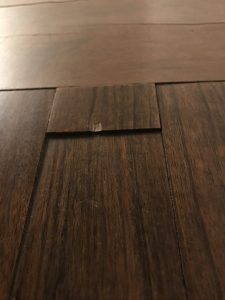A decision rendered some year ago by the first instance court of Arezzo (Tuscany, Italy) (judgement no. 789 of July 24, 2018) can give an idea on how Italian judges may under the CISG – the 1980 UN convention carrying a uniform law on international sale of goods – assess a claim for damages stemming from a supply of non-conforming goods, and how uniform laws may easily find application in a mixed form, i.e. somehow confused with local rules and traditions.
In brief, the story is the following one . A big Russian automobile component company had bought a full set of wood/stone-faced blocks to realize the covering of the floor of a large indoor pool parlour in a dacha near Moscow (it’s inevitable don’t think of some Russian tycoon putting his home expenses at the company’s cost, although nothing in the decision authorizes this malevolent interpretation, of course…).
. A big Russian automobile component company had bought a full set of wood/stone-faced blocks to realize the covering of the floor of a large indoor pool parlour in a dacha near Moscow (it’s inevitable don’t think of some Russian tycoon putting his home expenses at the company’s cost, although nothing in the decision authorizes this malevolent interpretation, of course…).
Anyway, the Russians pay the blocks in advance (some €100,000), and have the floor laid down just to discover soon after that many coverings (some 25% of the total) start detaching from the tiles, and the floor is a total disaster. The Italians try to fix out the defective tiles, to no avail though; and talks stop when the Italians offer to make the remedial works for free but to supply the new tiles at the buyer’s cost.
In the course of the lawsuit that followed, the tribunal’s expert has no doubt in identifying the origin of the problem in the inadequate glue the Italian had utilized in realizing the tiles (i.e. coupling a wood, or stone superficial layer of each tile to an aluminum base), any other factors excluded. Therefore, the court decision comes definitely against the supplier, and the buyer is awarded some €66.000 corresponding to the assessed portion of price relating to the faulty goods), plus interest from the day the lawsuit was commenced, and costs (including counsel’s legal fees).
We hasten to add that buyer had asked for more, namely the reimbursement of the total costs borne for having the floor dismantled, and duly reconstructed. Well, this additional claim was rejected, and in fact this is of particular interest from a legal point of view.
But first things first. Apparently, no choice of law was made in the contract and the court had to determine first of all which law had to be considered as appliable to the case at hand. Eventually, CISG was deemed as applicable, being both Italy and Russia members of said convention. Curiously, the court came to its decision on the point by firstly looking at the domestic rules on conflict (namely the law no. 218 of 1995 setting the Italian system of ‘international private law’) and the EU ‘Rome I’ regulation no. 593/2008 on the law applicable to contractual obligations), then concluding that the latter “shall not prejudice he application of international conventions to which one or more Member States are parties” (art. 25).
Having considered the faulty tiles as non-conforming goods under art. 35 CISG, the court considered that the buyer’s main claim was about a reduction of price. That is traditionally called actio quanti minori. In this respect, art. 50 CISG should be taken into consideration. It reads “[…] the buyer may reduce the price in the same proportion as the value that the goods actually delivered had at the time of the delivery bears to the value that conforming goods would have had at that time […]”. (It is noteworthy that CISG does not request any judicial decision for the buyer to reduce the price; however, this was not practically the case, having the buyer pre-paid the whole price, as said above). Actio quanti minori is a typical civil law remedy, virtually unknown in the common law systems.
The Arezzo court noted that, under a quanti minoris actio, the contract remains into effect, and it is just subject to a judicial modification. The fraction of price to be returned to the buyer due to the partial non-conformity of part of the supplied goods shall constitute the sole remedy; and no further damages may be awarded (not even by commencing a separate lawsuit). In particular, those stemming from the cost of dismantling and substituting the faulty tiles). Should the buyer have opt, on the contrary, for the contract avoidance under art. 49 CISG (which is traditionally regarded as an actio redhibitoria), he could have been entitled to the have the price returned, and also to be awarded all damages the any costs borne in relation to the purchase, and the return of the purchased goods (namely repairing the floor). The two actiones, and the relevant remedies are ‘ontologically’ – held the court – irreconcilable. However, this conclusion results in conflict with CISG, and a symptom of a ‘homeward trend’ attitude (i.e. a tendency to read the uniform laws throught domestic lenses only). Firstly, there’s no ‘ontological’ opposition between contract avoidance and price reduction, the latter being regarded as a partial avoidance as per art. 51 CISG. Secondly, and more important, art. 45 CISG that entitles the buyer EITHER to exercise the right to remedies provided under art. 46 to 52, AND to claim damages under art. 74 to 77. That means that a buyer may combine a price reduction under art. 50 CISG with an action for damages. This was the case in decisions by Supreme Court of Western Australia of Jan 17, 2003 – [2003] WASC 11; CIV 1647 of 1998 (a supply of contaminated contact lenses solution) and by Schweizerisches Bundesgericht of Oct 28, 1998 – 4C.179/1998/odi (a supply of non-conforming meat).
The text of the decision (in original Italian) may be provided for free. Please send a request to newsletter@lexmill.com












